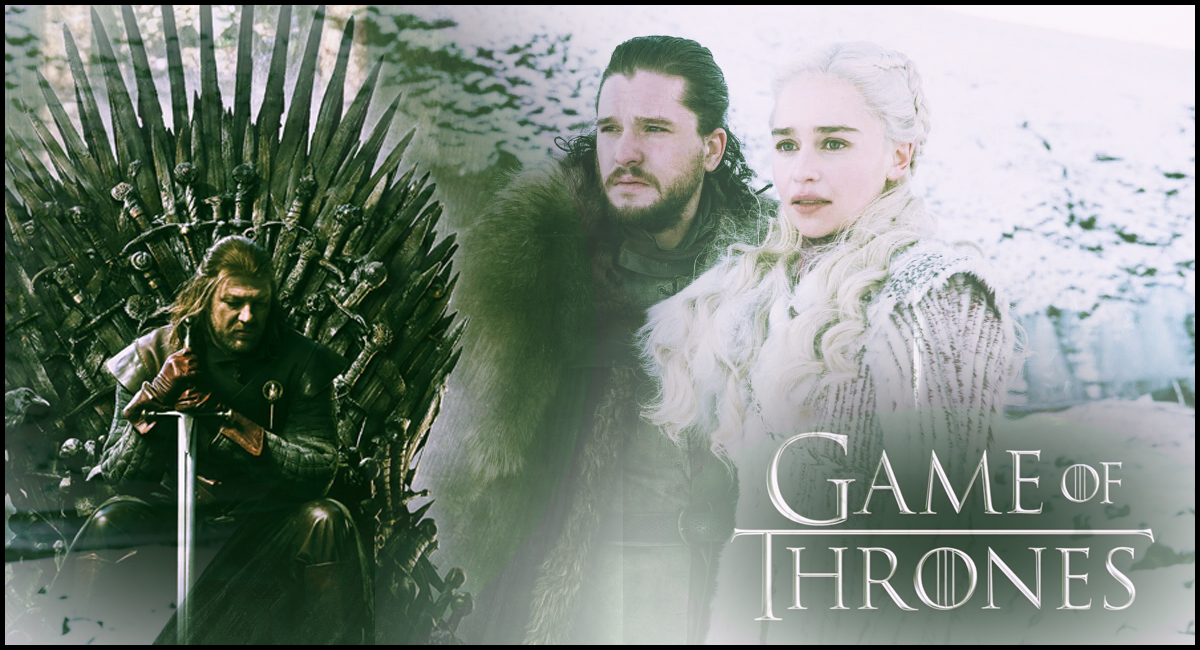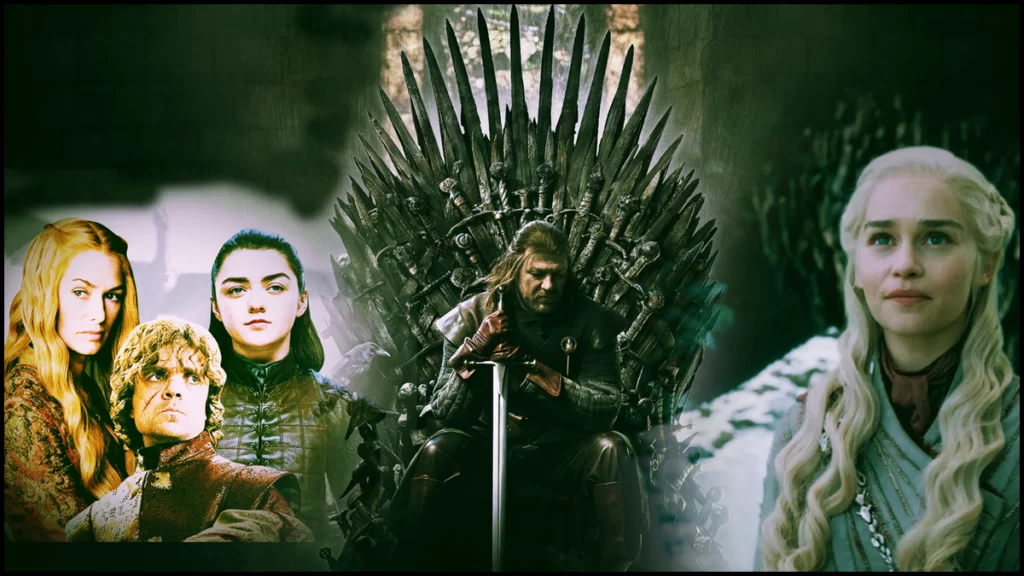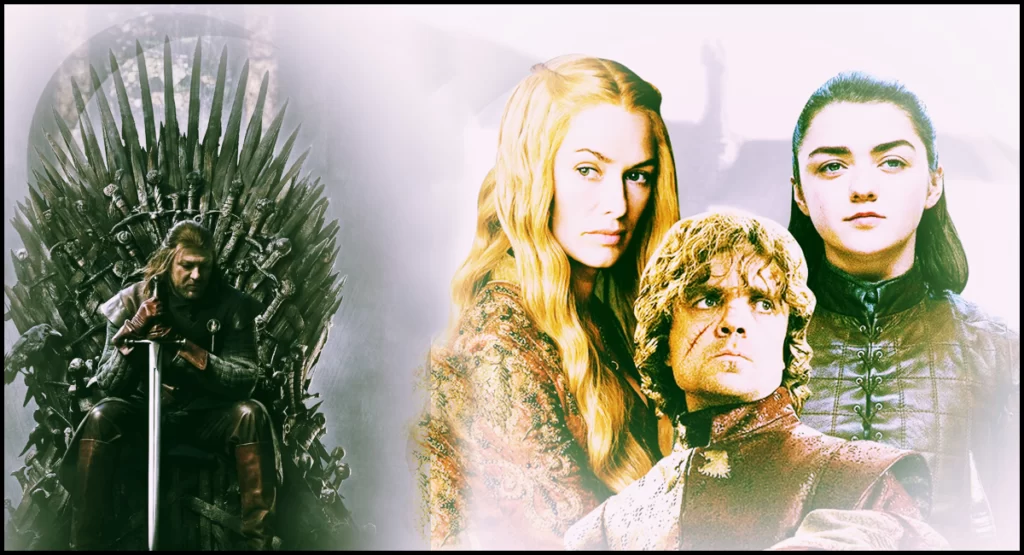
Game of Thrones: The Epic Saga– A Recap of the Game of Thrones Web Series
In the realm of television, few series have left as profound a mark as the Game of Thrones. Created by David Benioff and D.B. Weiss, this gripping fantasy drama, based on George R.R. Martin’s “A Song of Ice and Fire” series, took viewers on a rollercoaster ride through the fictional continents of Westeros and Essos. With a sweeping narrative that encompassed power struggles, betrayal, honor, and magic, Game of Thrones became a cultural phenomenon that captivated audiences worldwide.

Set in a medieval-inspired world, Game of Thrones revolved around the power struggles among noble families vying for control of the Iron Throne, the seat of power in the Seven Kingdoms of Westeros. The series begins with the death of Jon Arryn, the Hand of the King, which sets off a chain of events leading to political unrest and chaos. Eddard Stark, Lord of Winterfell, is appointed as the new Hand, propelling him into a treacherous journey of political maneuvering and uncovering dark secrets.
One of the central conflicts of the series is the War of the Five Kings. As various claimants contend for the Iron Throne, alliances are formed and broken, betrayals are committed, and battles are fought. The Starks of Winterfell, the Lannisters of Casterly Rock, the Baratheons of Storm’s End, the Greyjoys of Pyke, and the Tyrells of Highgarden are among the noble houses embroiled in this power struggle.
Key Characters The Epic Saga: Heroes and Villains of Westeros
The rich tapestry of Game of Thrones is woven by a diverse array of characters, each with their own motivations and ambitions. Eddard Stark’s sense of honor and duty clash with the cunning and manipulative Cersei Lannister, while Daenerys Targaryen, last of the exiled House Targaryen, embarks on a journey from a meek princess to a formidable leader, determined to reclaim the Iron Throne.
Tyrion Lannister, often referred to as the Imp, defies societal expectations due to his stature, relying on wit and intellect to navigate the treacherous political landscape. Jon Snow, Eddard Stark’s “bastard” son, rises through the ranks of the Night’s Watch, a sworn brotherhood guarding the realm from supernatural threats beyond the Wall.
Fantasy Elements: Dragons, White Walkers, and Magic-The Epic Saga
While political intrigue and human conflict form the core of Game of Thrones, the series introduces fantastical elements that further enrich its narrative. The reemergence of dragons, thought to be extinct for centuries, rekindles ancient legends and brings magic back into the world. Daenerys Targaryen hatches three dragon eggs and becomes the Mother of Dragons, leveraging these powerful creatures to achieve her goals.
Another looming threat is the White Walkers, malevolent ice beings capable of raising the dead to serve in their army. As winter approaches, the threat of the White Walkers becomes increasingly dire, prompting uneasy alliances and uniting unlikely allies against a common enemy.
Conclusion: Legacy and Impact
After eight gripping seasons, Game of Thrones concluded in a whirlwind of dramatic revelations, epic battles, and bittersweet endings. While the show received acclaim for its intricate storytelling and character development, the final season sparked intense debate among fans and critics regarding its pacing and resolution of character arcs.
Nonetheless, the impact of Game of Thrones on the television landscape is undeniable. It paved the way for high-budget fantasy series, demonstrating the appetite for complex narratives in the genre. Its characters, quotes, and iconic moments have become ingrained in popular culture, leaving a lasting legacy.
In a world where power shifts like the wind and allegiances can change in an instant, the Game of Thrones web series brought to life a captivating universe where no one was safe from the perils of ambition and betrayal. As we bid farewell to this epic tale, its intricate web of politics, power, and fantasy will continue to intrigue and inspire for generations to come.
Legacy and Impact: A Cultural Phenomenon-The Epic Saga
The cultural impact of Game of Thrones is undeniable. The series brought viewers into a world of elaborate costumes, breathtaking landscapes, and intricate political webs. It ignited debates and discussions, giving birth to fan theories and speculations that kept the online community abuzz between episodes. The series also had a profound influence on tourism, as fans flocked to real-world filming locations to experience the magic firsthand.

The character development within the show was unparalleled, with heroes and villains evolving in unpredictable ways. The series didn’t shy away from killing off major characters, leading to shocking twists that kept audiences on the edge of their seats. Iconic quotes like “Winter is coming” and “When you play the game of thrones, you win or you die” have become ingrained in pop culture.
Continued Exploration: Prequels and Spin-offs
The Game of Thrones universe continues to expand, even after the conclusion of the main series. HBO announced plans for a prequel series, “House of the Dragon,” which explores the history of House Targaryen and their dragons, set centuries before the events of the original show. This prequel promises to delve into the complexities of power and family dynamics, offering fans a new lens through which to explore the world of Westeros.
In addition to “House of the Dragon,” various other spin-off projects are in development, further enriching the Game of Thrones mythos. These projects aim to explore different corners of George R.R. Martin’s fictional universe, ensuring that the legacy of the series lives on for years to come.
Conclusion: A Game-Changing Epic Saga
In the realm of television, Game of Thrones stands as a game-changer, redefining what a fantasy series could achieve on the small screen. With its intricate plotlines, morally complex characters, and breathtaking visuals, the series captivated a global audience and sparked a renewed interest in the fantasy genre. As fans revisit the epic tale or venture into the franchise’s expanding universe, the impact of Game of Thrones on popular culture remains profound, reminding us that the struggle for power and the pursuit of honor are timeless themes that resonate across generations.
Game of Thrones: Unraveling the Epic Web of Power and Intrigue
Game of Thrones: Unraveling the Epic Web of Power and Intrigue
The Unforgettable Characters: Heroes and Villains of Westeros
One of the hallmarks of Game of Thrones is its rich cast of characters, each with their own compelling storylines. The honorable Eddard Stark, played by Sean Bean, finds himself plunged into the heart of political turmoil as he uncovers dark secrets surrounding the legitimacy of the king’s children. His wife, Catelyn Stark, portrayed by Michelle Fairley, showcases a mother’s fierce determination to protect her family.
The enigmatic Tyrion Lannister, brought to life by Peter Dinklage, captivates audiences with his wit and wisdom, often acting as the voice of reason amidst chaos. On the other side of the coin, the ruthless Cersei Lannister (Lena Headey) stops at nothing to secure her family’s grip on power, leading to a series of events that reverberate throughout the realm.
The Targaryen siblings also play a pivotal role. Emilia Clarke’s Daenerys Targaryen undergoes a transformative journey from an abused pawn to a powerful queen who commands dragons and strives to break the wheel of tyranny. Kit Harington’s Jon Snow navigates the complexities of his lineage and grapples with honor, duty, and love as he becomes a central figure in the fight against the looming threat of the White Walkers.
The Game of Thrones: Power Struggles and Political Machinations-The Epic Saga
The heart of Game of Thrones lies in its depiction of power struggles and political machinations. As various houses vie for control of the Iron Throne, alliances are forged and broken. Also betrayals are committed, and the repercussions of each decision ripple across the Seven Kingdoms.
House Stark, founded on principles of honor and loyalty, faces immense challenges. Robb Stark’s bid for independence leads to a tragic and brutal turn of events. While his siblings Arya and Sansa endure their own trials, growing into strong and resilient individuals. Meanwhile, the Lannisters, known for their cunning and manipulation. Also rise to prominence but find themselves entangled in a web of deception that threatens their legacy.
Fantasy Elements: Dragons, White Walkers, and Magic
The infusion of fantasy elements sets Game of Thrones apart from other political dramas. Daenerys Targaryen’s journey from a timid girl to a powerful leader. Is intertwined with her connection to dragons, mythical creatures that become her source of strength and authority. The return of magic to the world shapes the destinies of characters like Bran Stark. Also who develops the ability to warg into animals, and Melisandre, a mysterious priestess capable of wielding dark forces.
As winter approaches, the looming danger of the White Walkers adds an element of existential threat. These icy beings and their undead minions threaten to engulf the world in darkness and despair. The Battle of Hardhome and the Night King’s assault on Winterfell stand out as some of the most breathtaking and chilling moments in the series.
A Clash of Morality: Themes of Honor, Betrayal, and Redemption
Throughout Game of Thrones, characters grapple with moral dilemmas, blurring the lines between right and wrong. Eddard Stark’s unwavering honor ultimately leads to his downfall. While characters like Jaime Lannister (Nikolaj Coster-Waldau) undergo remarkable redemption arcs, shedding their tarnished reputations to emerge as unlikely heroes.
The series also delves into the complexities of loyalty and betrayal. The friendship between Jon Snow and Samwell Tarly (John Bradley) highlights the importance of camaraderie in a harsh world. Also while the bond between Sandor Clegane (Rory McCann) and Arya Stark reveals unexpected layers of humanity amidst the violence.
The Culmination: A Song of Ice and Fire Concludes
The culmination of Game of Thrones in its eighth season brought together various storylines in a crescendo of battles. Also revelations, and emotional farewells. The Battle of Winterfell, where the living faced the onslaught of the dead. And the climactic Battle of King’s Landing showcased the series’ grand-scale production and attention to detail.
However, the final season sparked polarized reactions. Some viewers appreciated the character-driven resolutions, while others felt certain storylines were rushed or unsatisfying. The series’ departure from the source material in later seasons contributed to the divergence of opinions.
Legacy and Beyond: A Lasting Impact
Despite the debates surrounding its ending, Game of Thrones undeniably left an indelible mark on the television landscape. Its production values, intricate storytelling, and exploration of complex themes set a new standard for the fantasy genre. Fans continue to discuss the series’ intricacies and speculate on the characters’ fates.
As the universe expands with prequels and spin-offs, including the anticipated “House of the Dragon.” The world of Westeros will continue to captivate audiences. The legacy of Game of Thrones lies not only in its gripping narratives. But also in its ability to foster a global community of fans who celebrate the unpredictable, brutal. And exhilarating journey that is the game of thrones.
Game of Thrones: Unraveling the Epic Web of Power and Intrigue
The Cultural Impact: A Global Phenomenon
Game of Thrones transcended the confines of television, becoming a global phenomenon that ignited conversations across cultures. Its sprawling narratives, intricate world-building, and diverse characters resonated with audiences around the world. The series spurred countless fan theories, artistic interpretations, and even academic discussions, showcasing its profound impact on modern storytelling.
The show’s iconic title sequence. Also featuring a map that morphed to reflect the locations featured in each episode, became instantly recognizable. Its haunting theme music by composer Ramin Djawadi further amplified the emotional intensity of key moments, whether triumphant or tragic. Fans eagerly anticipated the release of each new episode, often gathering to watch together and share their reactions online.
Behind the Scenes: The Craftsmanship of Westeros
The production of Game of Thrones was a monumental undertaking that required an extraordinary level of creativity and craftsmanship. From the intricately designed costumes that captured the essence of each house’s identity to the meticulously crafted sets that brought Westeros and Essos to life. And also every aspect of the show contributed to its immersive quality.
The series earned critical acclaim not only for its writing and acting but also for its technical achievements. The Battle of the Bastards, directed by Miguel Sapochnik, showcased a level of realism and intensity rarely seen on television. The dragons, brought to life through a combination of practical effects and CGI. Also became beloved characters in their own right, evoking a sense of wonder and awe.
Controversies and Debates: The Final Chapters
As with any story of epic proportions, Game of Thrones faced its share of controversies and debates. The final two seasons, in particular, drew mixed reactions from fans and critics alike. The hastened resolution of certain character arcs, the handling of key plot points. And the pacing of the storylines sparked passionate discussions within the fandom.
The diverse and nuanced reactions highlighted the deeply personal connections fans had forged with the characters and the world of Westeros. While some appreciated the series’ subversion of traditional storytelling tropes, others expressed disappointment in the outcomes of certain character arcs.
Looking Forward: The Expanding Universe
The conclusion of Game of Thrones on television marked the end of an era. But it was far from the end of the story. The franchise continues to evolve and expand, with a multitude of exciting projects on the horizon. “House of the Dragon,” the eagerly anticipated prequel, promises to delve into the history of House Targaryen. Also uncovering the intricate webs of power and intrigue that shaped the world.
Additionally, other spin-offs and adaptations are in development, further exploring the lore of George R.R. Martin’s universe. These projects ensure that the legacy of Game of Thrones will endure for generations. Also captivating both devoted fans and newcomers to the series.
Also Read – Review of Heart of Stone
In Conclusion: A Game of Legacy
Game of Thrones stands as a testament to the power of storytelling. Its ability to weave together themes of power, honor, betrayal. And magic within a richly detailed world captured the hearts and minds of millions. The show’s complex characters, intricate political landscape. And fantastical elements created an unforgettable experience that transcended the boundaries of the television screen.
As we look back on the epic journey of Game of Thrones. Also we’re reminded that its impact goes beyond the controversies and debates. It reshaped the television landscape, introduced audiences to a world both captivating and treacherous. And spurred conversations that will endure for years to come. The battle for the Iron Throne might have concluded, but the legacy of Game of Thrones is one that will continue to shape the way we approach storytelling and fantasy for generations to come.
Also Read – Hair Loss: Causes, Prevention, and Treatment

One thought on “Game of Thrones: A Tale of Power and Intrigue”